Advanced Corporate Accounting (ACC5CRE): IFRS Adoption Report
VerifiedAdded on 2022/10/08
|7
|1428
|18
Report
AI Summary
This report delves into the complexities of International Financial Reporting Standards (IFRS) adoption, examining the reasons behind the US's non-adoption of IFRS compared to the adoption in countries like Australia and the European Union. It analyzes the challenges faced by the International Accounting Standards Board (IASB) in harmonizing accounting standards globally, including cultural, political, and compliance issues. The report also assesses the potential success of IASB in standardizing accounting practices worldwide, highlighting the benefits of IFRS adoption, such as increased comparability of financial statements. Additionally, the report covers the reasons for the non-adoption of IFRS by the FASB in the US, such as high switching costs, the existing deficiencies in IFRS standards, and the suitability of GAAP for the US. The report is concluded by summarizing the main points regarding IFRS adoption and its impact on the accounting landscape.
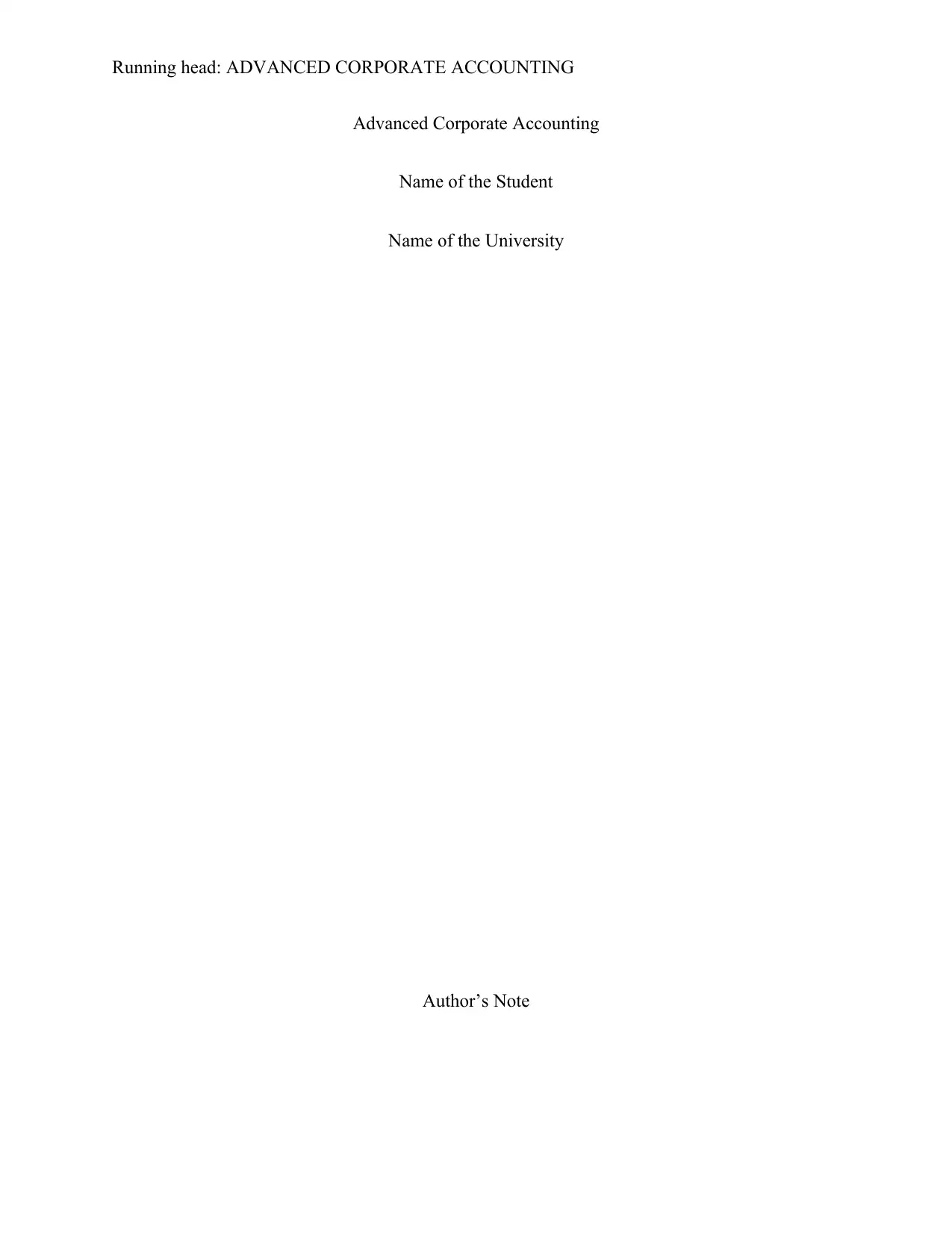
Running head: ADVANCED CORPORATE ACCOUNTING
Advanced Corporate Accounting
Name of the Student
Name of the University
Author’s Note
Advanced Corporate Accounting
Name of the Student
Name of the University
Author’s Note
Paraphrase This Document
Need a fresh take? Get an instant paraphrase of this document with our AI Paraphraser
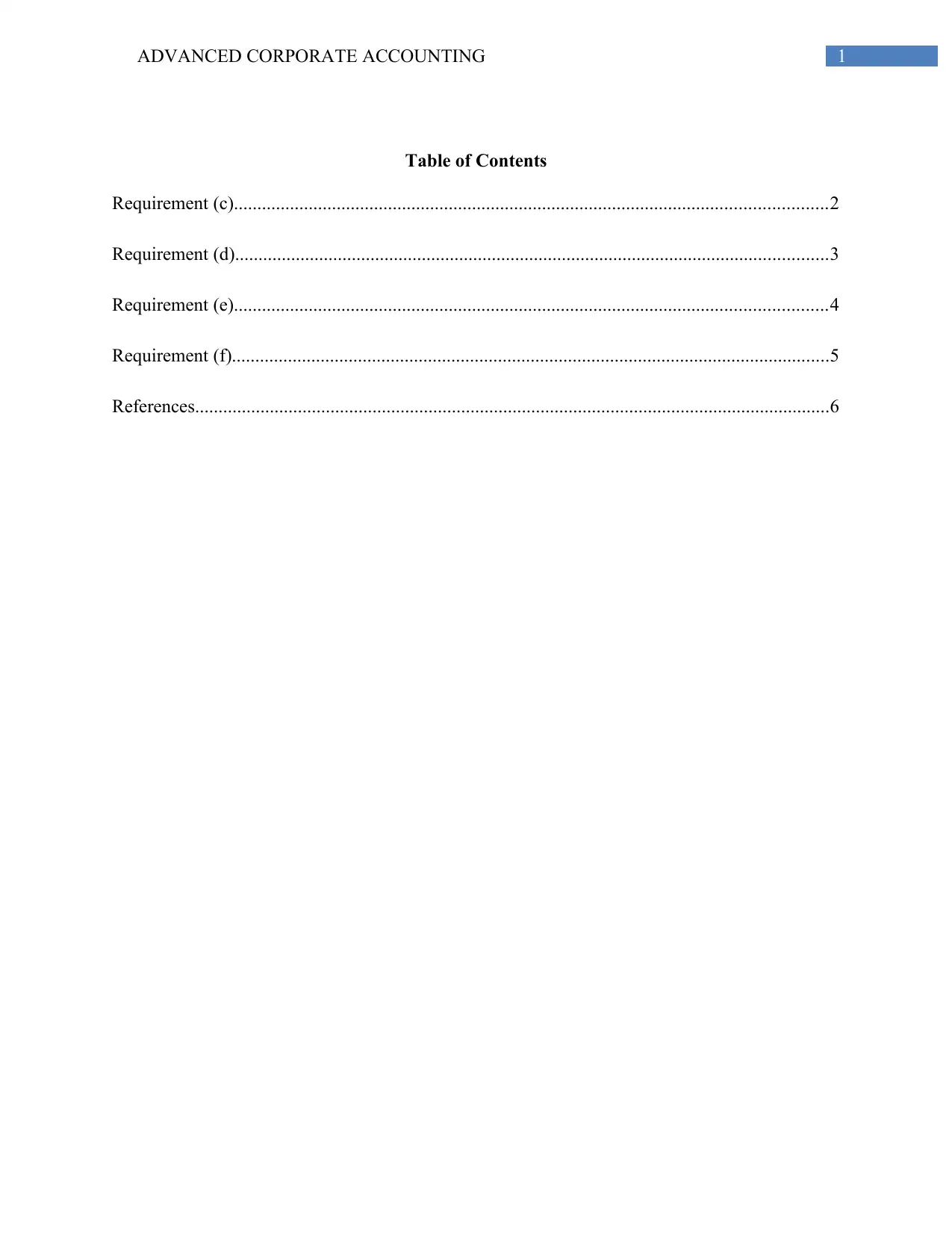
1ADVANCED CORPORATE ACCOUNTING
Table of Contents
Requirement (c)...............................................................................................................................2
Requirement (d)...............................................................................................................................3
Requirement (e)...............................................................................................................................4
Requirement (f)................................................................................................................................5
References........................................................................................................................................6
Table of Contents
Requirement (c)...............................................................................................................................2
Requirement (d)...............................................................................................................................3
Requirement (e)...............................................................................................................................4
Requirement (f)................................................................................................................................5
References........................................................................................................................................6
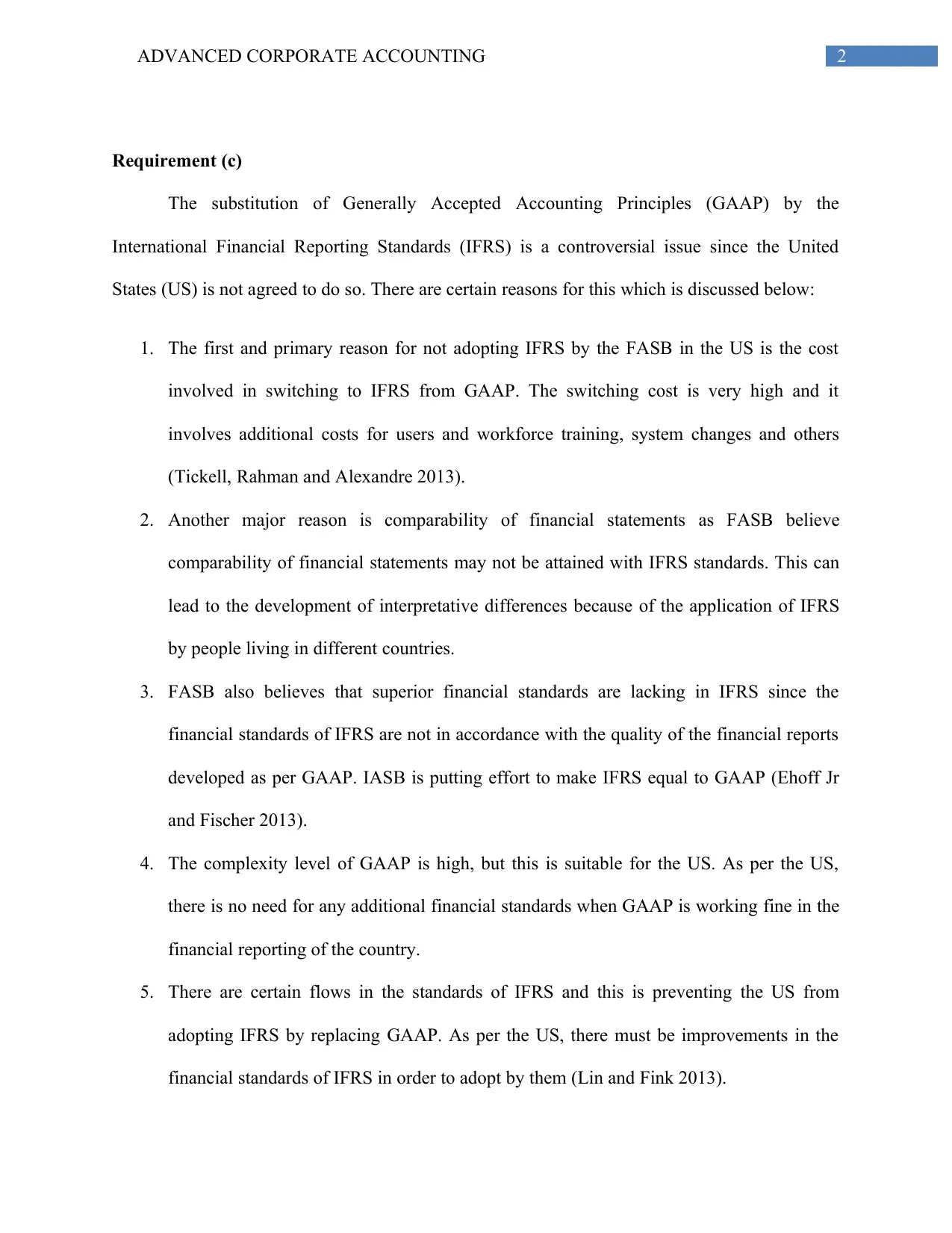
2ADVANCED CORPORATE ACCOUNTING
Requirement (c)
The substitution of Generally Accepted Accounting Principles (GAAP) by the
International Financial Reporting Standards (IFRS) is a controversial issue since the United
States (US) is not agreed to do so. There are certain reasons for this which is discussed below:
1. The first and primary reason for not adopting IFRS by the FASB in the US is the cost
involved in switching to IFRS from GAAP. The switching cost is very high and it
involves additional costs for users and workforce training, system changes and others
(Tickell, Rahman and Alexandre 2013).
2. Another major reason is comparability of financial statements as FASB believe
comparability of financial statements may not be attained with IFRS standards. This can
lead to the development of interpretative differences because of the application of IFRS
by people living in different countries.
3. FASB also believes that superior financial standards are lacking in IFRS since the
financial standards of IFRS are not in accordance with the quality of the financial reports
developed as per GAAP. IASB is putting effort to make IFRS equal to GAAP (Ehoff Jr
and Fischer 2013).
4. The complexity level of GAAP is high, but this is suitable for the US. As per the US,
there is no need for any additional financial standards when GAAP is working fine in the
financial reporting of the country.
5. There are certain flows in the standards of IFRS and this is preventing the US from
adopting IFRS by replacing GAAP. As per the US, there must be improvements in the
financial standards of IFRS in order to adopt by them (Lin and Fink 2013).
Requirement (c)
The substitution of Generally Accepted Accounting Principles (GAAP) by the
International Financial Reporting Standards (IFRS) is a controversial issue since the United
States (US) is not agreed to do so. There are certain reasons for this which is discussed below:
1. The first and primary reason for not adopting IFRS by the FASB in the US is the cost
involved in switching to IFRS from GAAP. The switching cost is very high and it
involves additional costs for users and workforce training, system changes and others
(Tickell, Rahman and Alexandre 2013).
2. Another major reason is comparability of financial statements as FASB believe
comparability of financial statements may not be attained with IFRS standards. This can
lead to the development of interpretative differences because of the application of IFRS
by people living in different countries.
3. FASB also believes that superior financial standards are lacking in IFRS since the
financial standards of IFRS are not in accordance with the quality of the financial reports
developed as per GAAP. IASB is putting effort to make IFRS equal to GAAP (Ehoff Jr
and Fischer 2013).
4. The complexity level of GAAP is high, but this is suitable for the US. As per the US,
there is no need for any additional financial standards when GAAP is working fine in the
financial reporting of the country.
5. There are certain flows in the standards of IFRS and this is preventing the US from
adopting IFRS by replacing GAAP. As per the US, there must be improvements in the
financial standards of IFRS in order to adopt by them (Lin and Fink 2013).
⊘ This is a preview!⊘
Do you want full access?
Subscribe today to unlock all pages.

Trusted by 1+ million students worldwide
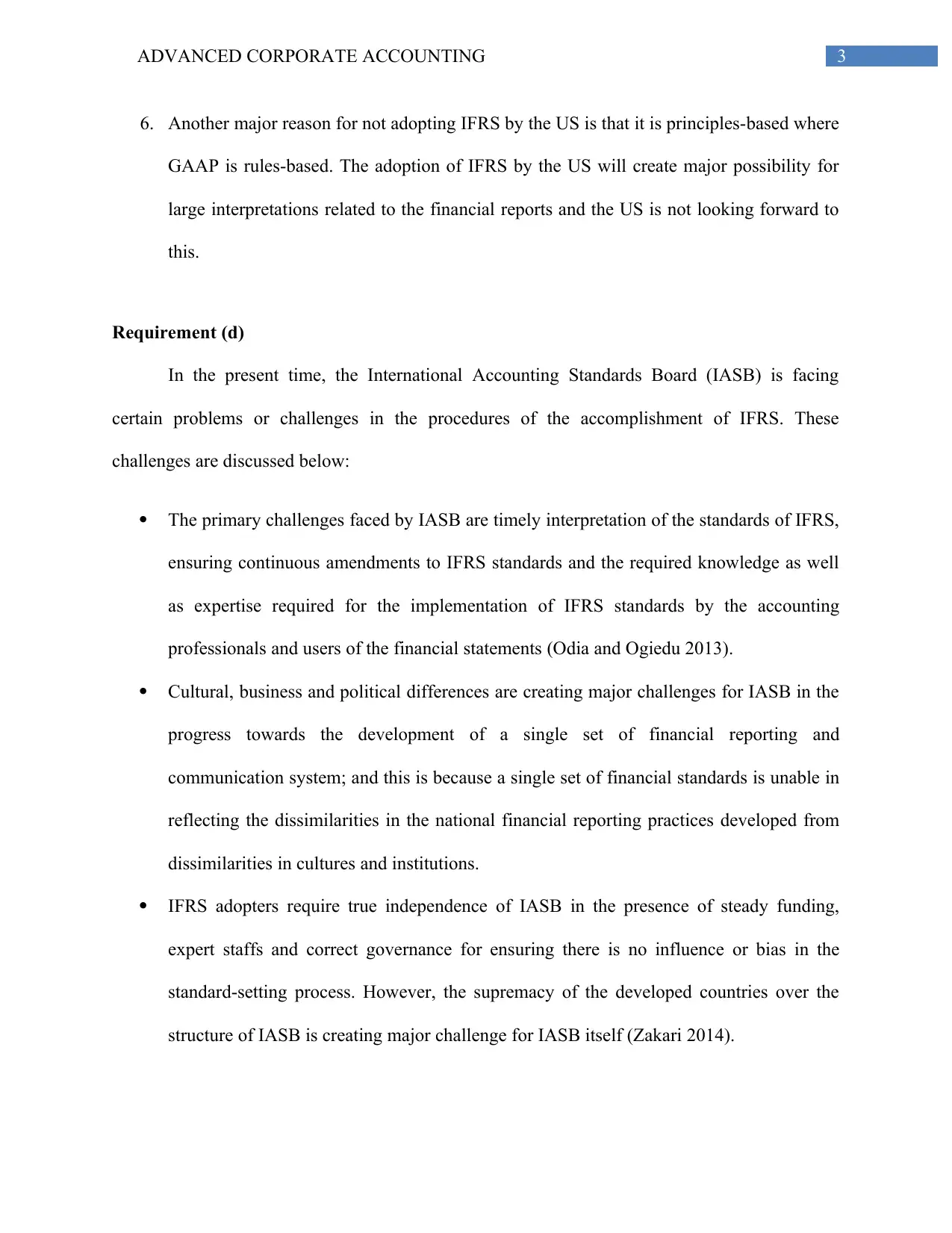
3ADVANCED CORPORATE ACCOUNTING
6. Another major reason for not adopting IFRS by the US is that it is principles-based where
GAAP is rules-based. The adoption of IFRS by the US will create major possibility for
large interpretations related to the financial reports and the US is not looking forward to
this.
Requirement (d)
In the present time, the International Accounting Standards Board (IASB) is facing
certain problems or challenges in the procedures of the accomplishment of IFRS. These
challenges are discussed below:
The primary challenges faced by IASB are timely interpretation of the standards of IFRS,
ensuring continuous amendments to IFRS standards and the required knowledge as well
as expertise required for the implementation of IFRS standards by the accounting
professionals and users of the financial statements (Odia and Ogiedu 2013).
Cultural, business and political differences are creating major challenges for IASB in the
progress towards the development of a single set of financial reporting and
communication system; and this is because a single set of financial standards is unable in
reflecting the dissimilarities in the national financial reporting practices developed from
dissimilarities in cultures and institutions.
IFRS adopters require true independence of IASB in the presence of steady funding,
expert staffs and correct governance for ensuring there is no influence or bias in the
standard-setting process. However, the supremacy of the developed countries over the
structure of IASB is creating major challenge for IASB itself (Zakari 2014).
6. Another major reason for not adopting IFRS by the US is that it is principles-based where
GAAP is rules-based. The adoption of IFRS by the US will create major possibility for
large interpretations related to the financial reports and the US is not looking forward to
this.
Requirement (d)
In the present time, the International Accounting Standards Board (IASB) is facing
certain problems or challenges in the procedures of the accomplishment of IFRS. These
challenges are discussed below:
The primary challenges faced by IASB are timely interpretation of the standards of IFRS,
ensuring continuous amendments to IFRS standards and the required knowledge as well
as expertise required for the implementation of IFRS standards by the accounting
professionals and users of the financial statements (Odia and Ogiedu 2013).
Cultural, business and political differences are creating major challenges for IASB in the
progress towards the development of a single set of financial reporting and
communication system; and this is because a single set of financial standards is unable in
reflecting the dissimilarities in the national financial reporting practices developed from
dissimilarities in cultures and institutions.
IFRS adopters require true independence of IASB in the presence of steady funding,
expert staffs and correct governance for ensuring there is no influence or bias in the
standard-setting process. However, the supremacy of the developed countries over the
structure of IASB is creating major challenge for IASB itself (Zakari 2014).
Paraphrase This Document
Need a fresh take? Get an instant paraphrase of this document with our AI Paraphraser
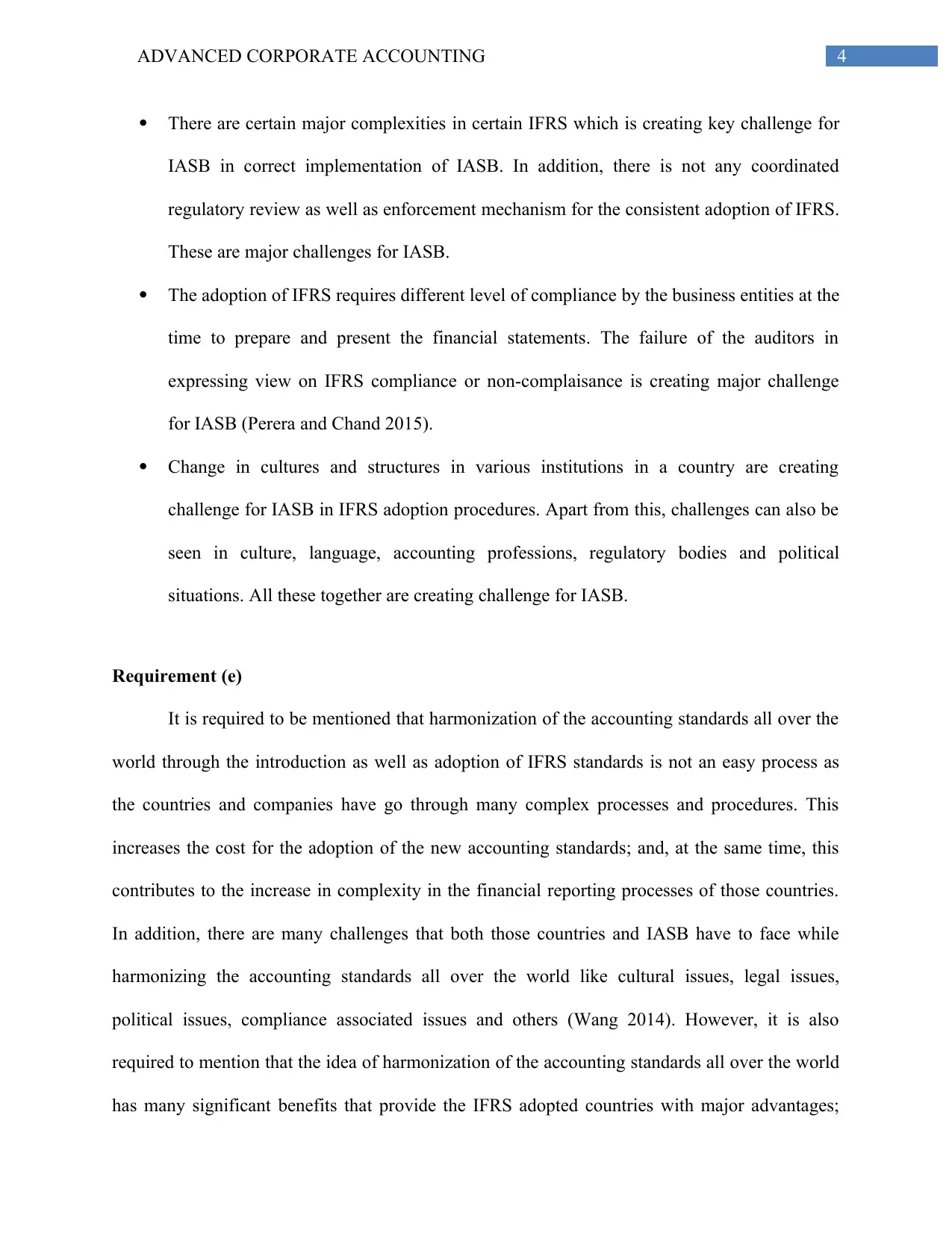
4ADVANCED CORPORATE ACCOUNTING
There are certain major complexities in certain IFRS which is creating key challenge for
IASB in correct implementation of IASB. In addition, there is not any coordinated
regulatory review as well as enforcement mechanism for the consistent adoption of IFRS.
These are major challenges for IASB.
The adoption of IFRS requires different level of compliance by the business entities at the
time to prepare and present the financial statements. The failure of the auditors in
expressing view on IFRS compliance or non-complaisance is creating major challenge
for IASB (Perera and Chand 2015).
Change in cultures and structures in various institutions in a country are creating
challenge for IASB in IFRS adoption procedures. Apart from this, challenges can also be
seen in culture, language, accounting professions, regulatory bodies and political
situations. All these together are creating challenge for IASB.
Requirement (e)
It is required to be mentioned that harmonization of the accounting standards all over the
world through the introduction as well as adoption of IFRS standards is not an easy process as
the countries and companies have go through many complex processes and procedures. This
increases the cost for the adoption of the new accounting standards; and, at the same time, this
contributes to the increase in complexity in the financial reporting processes of those countries.
In addition, there are many challenges that both those countries and IASB have to face while
harmonizing the accounting standards all over the world like cultural issues, legal issues,
political issues, compliance associated issues and others (Wang 2014). However, it is also
required to mention that the idea of harmonization of the accounting standards all over the world
has many significant benefits that provide the IFRS adopted countries with major advantages;
There are certain major complexities in certain IFRS which is creating key challenge for
IASB in correct implementation of IASB. In addition, there is not any coordinated
regulatory review as well as enforcement mechanism for the consistent adoption of IFRS.
These are major challenges for IASB.
The adoption of IFRS requires different level of compliance by the business entities at the
time to prepare and present the financial statements. The failure of the auditors in
expressing view on IFRS compliance or non-complaisance is creating major challenge
for IASB (Perera and Chand 2015).
Change in cultures and structures in various institutions in a country are creating
challenge for IASB in IFRS adoption procedures. Apart from this, challenges can also be
seen in culture, language, accounting professions, regulatory bodies and political
situations. All these together are creating challenge for IASB.
Requirement (e)
It is required to be mentioned that harmonization of the accounting standards all over the
world through the introduction as well as adoption of IFRS standards is not an easy process as
the countries and companies have go through many complex processes and procedures. This
increases the cost for the adoption of the new accounting standards; and, at the same time, this
contributes to the increase in complexity in the financial reporting processes of those countries.
In addition, there are many challenges that both those countries and IASB have to face while
harmonizing the accounting standards all over the world like cultural issues, legal issues,
political issues, compliance associated issues and others (Wang 2014). However, it is also
required to mention that the idea of harmonization of the accounting standards all over the world
has many significant benefits that provide the IFRS adopted countries with major advantages;
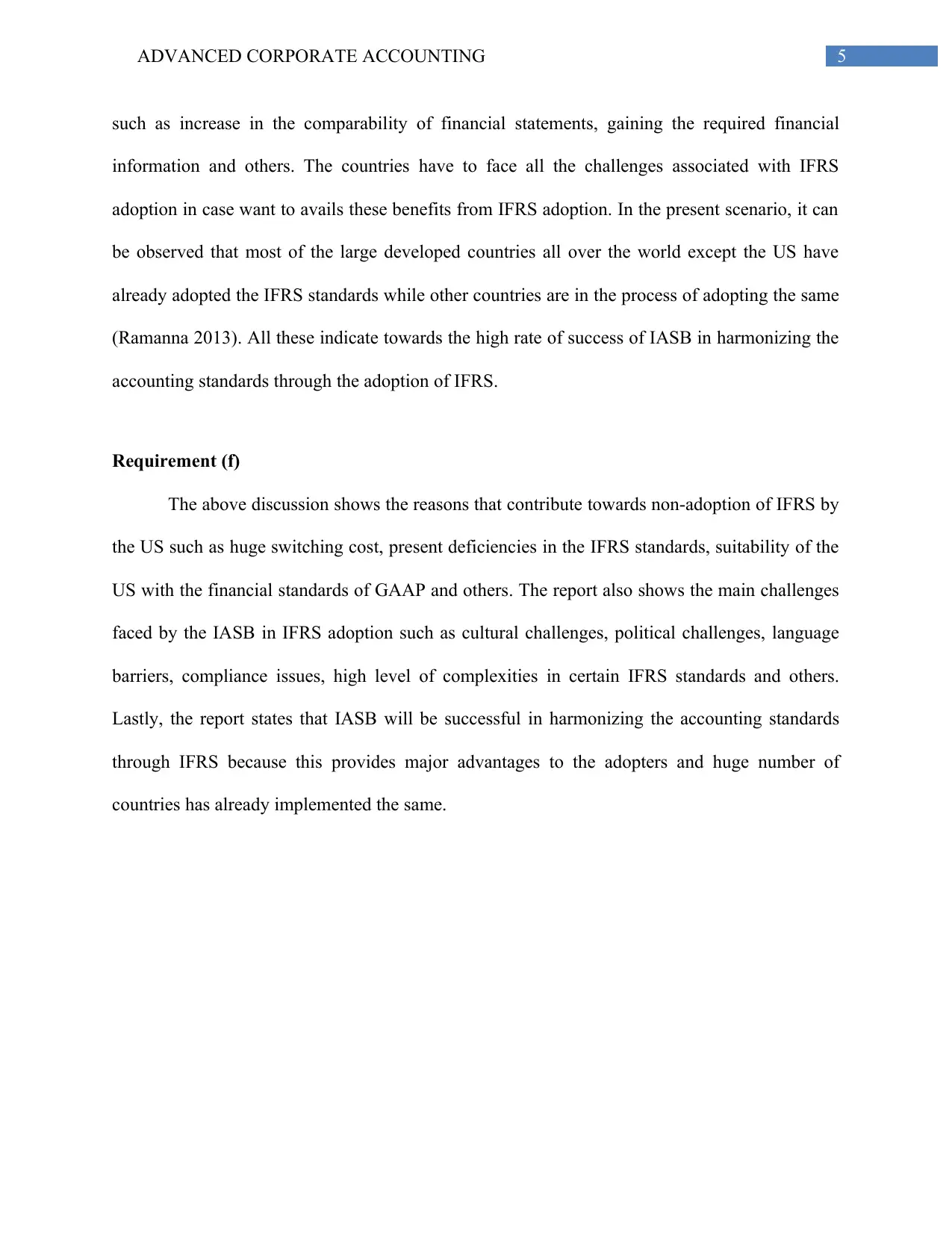
5ADVANCED CORPORATE ACCOUNTING
such as increase in the comparability of financial statements, gaining the required financial
information and others. The countries have to face all the challenges associated with IFRS
adoption in case want to avails these benefits from IFRS adoption. In the present scenario, it can
be observed that most of the large developed countries all over the world except the US have
already adopted the IFRS standards while other countries are in the process of adopting the same
(Ramanna 2013). All these indicate towards the high rate of success of IASB in harmonizing the
accounting standards through the adoption of IFRS.
Requirement (f)
The above discussion shows the reasons that contribute towards non-adoption of IFRS by
the US such as huge switching cost, present deficiencies in the IFRS standards, suitability of the
US with the financial standards of GAAP and others. The report also shows the main challenges
faced by the IASB in IFRS adoption such as cultural challenges, political challenges, language
barriers, compliance issues, high level of complexities in certain IFRS standards and others.
Lastly, the report states that IASB will be successful in harmonizing the accounting standards
through IFRS because this provides major advantages to the adopters and huge number of
countries has already implemented the same.
such as increase in the comparability of financial statements, gaining the required financial
information and others. The countries have to face all the challenges associated with IFRS
adoption in case want to avails these benefits from IFRS adoption. In the present scenario, it can
be observed that most of the large developed countries all over the world except the US have
already adopted the IFRS standards while other countries are in the process of adopting the same
(Ramanna 2013). All these indicate towards the high rate of success of IASB in harmonizing the
accounting standards through the adoption of IFRS.
Requirement (f)
The above discussion shows the reasons that contribute towards non-adoption of IFRS by
the US such as huge switching cost, present deficiencies in the IFRS standards, suitability of the
US with the financial standards of GAAP and others. The report also shows the main challenges
faced by the IASB in IFRS adoption such as cultural challenges, political challenges, language
barriers, compliance issues, high level of complexities in certain IFRS standards and others.
Lastly, the report states that IASB will be successful in harmonizing the accounting standards
through IFRS because this provides major advantages to the adopters and huge number of
countries has already implemented the same.
⊘ This is a preview!⊘
Do you want full access?
Subscribe today to unlock all pages.

Trusted by 1+ million students worldwide
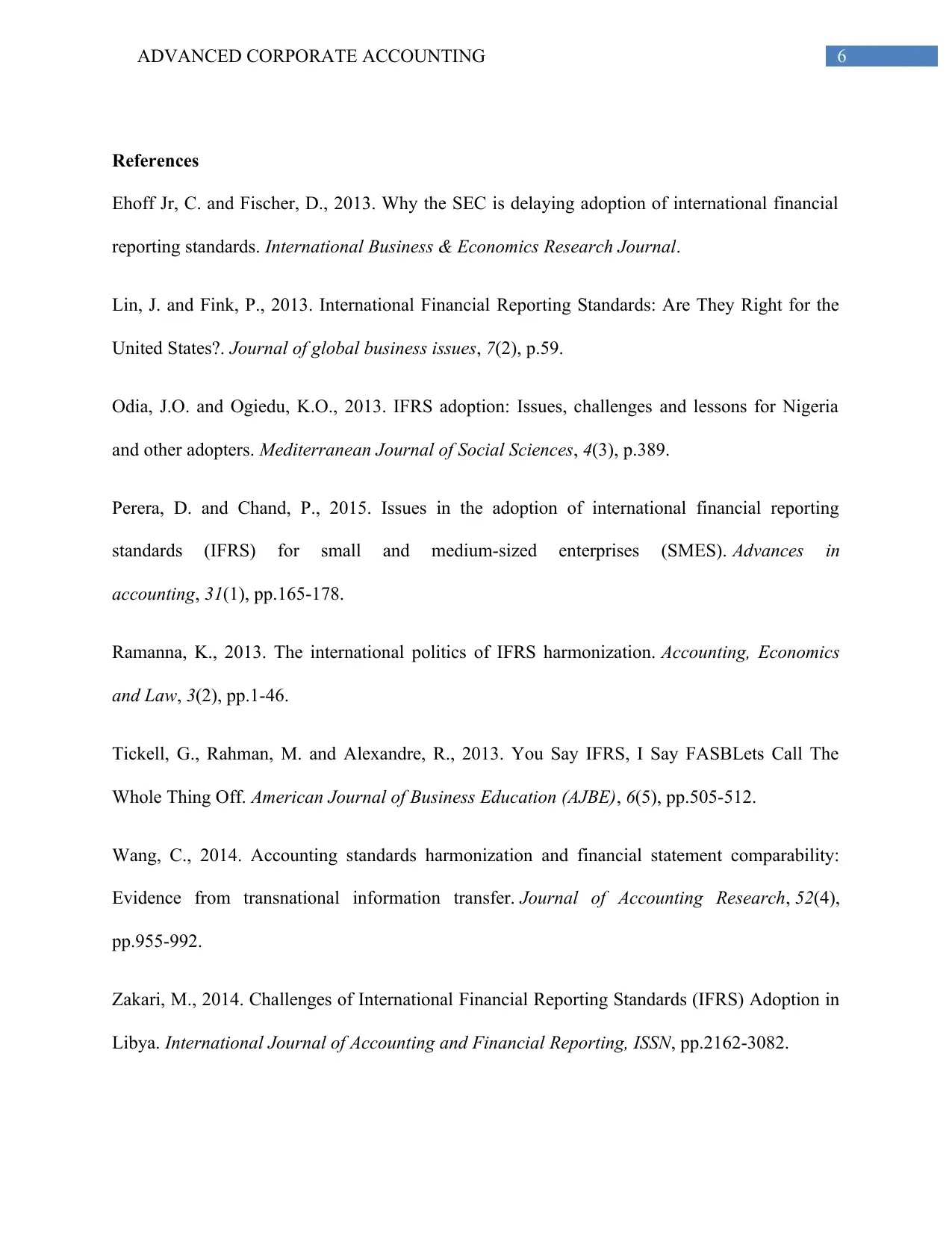
6ADVANCED CORPORATE ACCOUNTING
References
Ehoff Jr, C. and Fischer, D., 2013. Why the SEC is delaying adoption of international financial
reporting standards. International Business & Economics Research Journal.
Lin, J. and Fink, P., 2013. International Financial Reporting Standards: Are They Right for the
United States?. Journal of global business issues, 7(2), p.59.
Odia, J.O. and Ogiedu, K.O., 2013. IFRS adoption: Issues, challenges and lessons for Nigeria
and other adopters. Mediterranean Journal of Social Sciences, 4(3), p.389.
Perera, D. and Chand, P., 2015. Issues in the adoption of international financial reporting
standards (IFRS) for small and medium-sized enterprises (SMES). Advances in
accounting, 31(1), pp.165-178.
Ramanna, K., 2013. The international politics of IFRS harmonization. Accounting, Economics
and Law, 3(2), pp.1-46.
Tickell, G., Rahman, M. and Alexandre, R., 2013. You Say IFRS, I Say FASBLets Call The
Whole Thing Off. American Journal of Business Education (AJBE), 6(5), pp.505-512.
Wang, C., 2014. Accounting standards harmonization and financial statement comparability:
Evidence from transnational information transfer. Journal of Accounting Research, 52(4),
pp.955-992.
Zakari, M., 2014. Challenges of International Financial Reporting Standards (IFRS) Adoption in
Libya. International Journal of Accounting and Financial Reporting, ISSN, pp.2162-3082.
References
Ehoff Jr, C. and Fischer, D., 2013. Why the SEC is delaying adoption of international financial
reporting standards. International Business & Economics Research Journal.
Lin, J. and Fink, P., 2013. International Financial Reporting Standards: Are They Right for the
United States?. Journal of global business issues, 7(2), p.59.
Odia, J.O. and Ogiedu, K.O., 2013. IFRS adoption: Issues, challenges and lessons for Nigeria
and other adopters. Mediterranean Journal of Social Sciences, 4(3), p.389.
Perera, D. and Chand, P., 2015. Issues in the adoption of international financial reporting
standards (IFRS) for small and medium-sized enterprises (SMES). Advances in
accounting, 31(1), pp.165-178.
Ramanna, K., 2013. The international politics of IFRS harmonization. Accounting, Economics
and Law, 3(2), pp.1-46.
Tickell, G., Rahman, M. and Alexandre, R., 2013. You Say IFRS, I Say FASBLets Call The
Whole Thing Off. American Journal of Business Education (AJBE), 6(5), pp.505-512.
Wang, C., 2014. Accounting standards harmonization and financial statement comparability:
Evidence from transnational information transfer. Journal of Accounting Research, 52(4),
pp.955-992.
Zakari, M., 2014. Challenges of International Financial Reporting Standards (IFRS) Adoption in
Libya. International Journal of Accounting and Financial Reporting, ISSN, pp.2162-3082.
1 out of 7
Related Documents
Your All-in-One AI-Powered Toolkit for Academic Success.
+13062052269
info@desklib.com
Available 24*7 on WhatsApp / Email
![[object Object]](/_next/static/media/star-bottom.7253800d.svg)
Unlock your academic potential
Copyright © 2020–2026 A2Z Services. All Rights Reserved. Developed and managed by ZUCOL.





